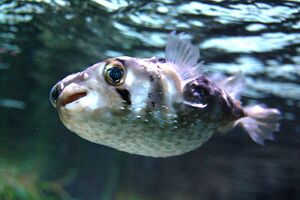Porcupinefish: Difference between revisions
Nicesociety (talk | contribs) (Created page with 'thumb|right|300px|A Terran Porcupinefish Porcupinefish are fish of the family Diodontidae, (order Tetraodontiformes), also commonly called blowfis…') |
(No difference)
|
Latest revision as of 20:00, 22 April 2010
Porcupinefish are fish of the family Diodontidae, (order Tetraodontiformes), also commonly called blowfish (and, sometimes, "balloonfish" and "globefish").
They are sometimes confused with pufferfish. Porcupinefish are closely related to pufferfishes but porcupinefish have heavier spines (hence the name porcupine) on their body. Also unlike the pufferfishes, they have only a single plate of fused teeth in each of the upper and lower jaws.
Porcupinefish are medium to large sized fish, and are found in shallow temperate and tropical seas on Earth. A few species are found much further out from shore, wherein large shoals of thousands of individuals can occur. They are generally slow.
Porcupinefish have the ability to inflate their body by swallowing water or air, thereby becoming rounder. This increase in size (almost double vertically) reduces the range of potential predators to those with much bigger mouths. A second defense mechanism is provided by the sharp spines, which radiate outwards when the fish is inflated. Some species are poisonous, having a tetrodotoxin in their internal organs, such as the ovaries and liver. This neurotoxin is at least 1200 times more potent than cyanide, but some scientists believe it is produced by several types of bacteria that are somehow obtained from the fish's diet as fish bred in captivity are not poisonous, while others are skeptical of this theory. As a result porcupinefish have few predators, although adults are sometimes preyed upon by sharks and orcas. Juveniles are also preyed on by tuna and dolphins.
See Also: Tetrodotoxin
